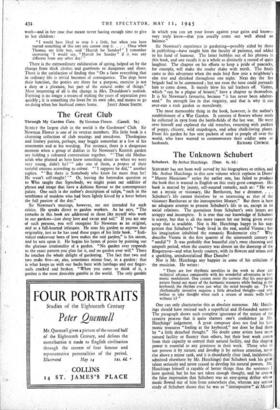The Great Club
Through My Garden date. By Newman Flower. (Cassell. 5s.) SURELY the largest club in the world is the Gardeners' Club. Sir Newman Flower is one of its veteran members. His little book is a charming collection of club musings and anecdotes. Theologians and literary purists, perhaps, may boggle somewhat at a few of his statements and at his wording. For instance, there is a dangerous moment when a group of dahlias in Sir Newman's Kentish garden are holding a coloured conversation together. "'That old Methu- selah who planted us here knew something about us when we were very young, didn't he? '" asks one of them, a propos of their tasteful stations according to colour. "'I suppose he did,'" another replies. " ' But there is Somebody who knew far more than he! He wasn't self-taught! ' " Or, leaving the heterodox question as to Who taught that Somebody, we might point out oddities of phrase and image that have a dubious flavour to the contemporary palate. One such is the author's description of tulips, " each in the semblance of maidens who had been lightly kissed by a lover before the full passion of the day."
Sir Newman's musings, however, are not intended for such critics. He speaks direct to garden workers. As he says, "The remarks in this book are addressed to those like myself who work in our gardens—just sheej love and sweat and toil." If you are one of such persons, you will recognise Sir Newman as an original, and as a full-hearted infatuate. He uses his garden to express that originality, just as he has used these pages of his little book. "Indi- vidual endeavour born of love makes the real garden," is his axiom, and he acts upon it. He begins his hymn of praise by pointing out the glorious irrationality of a garden. "No garden ever responds to the exact pattern you plan for it, and no garden ever will." There he touches the whole delight of gardening. The fact that two and two make five—or, alas, sometimes minus four, in a garden: that is what keeps us with our backs bent with lumbago and our finger- nails cracked and broken. "When you come to think of it, a garden is the most desirable gamble in the world. The only gamble in which you can set your losses against your gains and know— very truly know—that you usually come out well ahead on balance."
Sir Newman's experience in gardening—possibly aided by those in publishing—have taught him the faculty of patience, and added to his fund of humour. The latter bubbles out of his phrases in this book, and one recalls it as a whole as distinctly a record of quiet laughter. The chapter on his efforts to keep a pride of peacocks, for example, will make the reader shake with mirth. The finale came to this adventure when the male bird flew into a neighbour's elm tree and shrieked throughout one night.' Next day the fire brigade had to be summoned; not even the hose could persuade him to come down. It merey blew his tail feathers off. Violets, which " can be a plague of beauty," have a chapter to themselves. It is Sir Newman's favourite, because " it has never been adulter- ated." Its strength lies in that virginity, and that is why it. can over-run a rock garden so mercilessly.
The most memorable thing in the book, however, is the author's establishment of a War Garden. It consists of flowers whose seed3 he collected in 1919 from the battle-fields of the last war. He went over himself and explored the old trenches, returning with packets of poppy,- chicory, wild snapdragon, and other chalk-loving plants. From his garden he has sent packets of seed to people all over the world, who have wanted to commemorate their soldier sons or






















 Previous page
Previous page